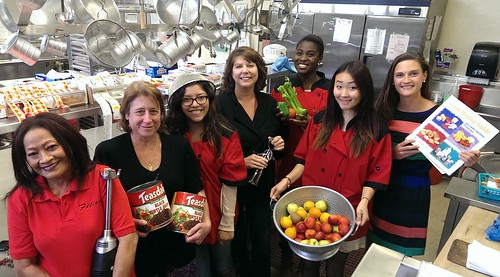
Locally-sourced fish baked in fresh herbs and oil topped with a fresh cilantro slaw…It sounds like a dish from a five star restaurant, but it’s just one of many recipes registered dietitian and director of nutrition services Jenn Gerard offers students for lunch in her California school district. Learn how Monterey Peninsula Schools embraced the new nutrition standards, using them as a springboard to enhance their impressive school meals programs.
By Jenn Gerard, R.D., Director of Nutrition Services, Monterey Peninsula Unified School District
I began my career in child nutrition at 26 years old in the Monterey Peninsula Unified School District (MPUSD). Six months later I was stepping into the director position during one of the biggest changes in school meal regulations, attributed to the Healthy, Hunger-Free Kids Act (HHFKA) of 2010.
Being young and enthusiastic has its perks, as you embark on change with energy and idealism. At MPUSD, we already adopted many of the major changes in the regulations, as have many districts in California and across the nation.
While there is no doubt that fresh fruits and vegetables, whole-grains and low-fat dairy contribute to a healthy diet, I believe the greatest contribution of the HHFKA is empowering districts to return to some form of scratch-cooking. Some schools never stopped, while others are just beginning to get their feet wet.
Nothing contributes to health more than serving real ingredients prepared with care, creativity and attention to quality. At MPUSD, the new meal pattern supports our efforts in recipe development. The menu is inspired by our multi-cultural student population and sustained by a rock-star staff providing the best meals possible each and every day.
Through this process we have been able to engage students more than ever. A particularly special partnership has blossomed from the Seaside High School Culinary Arts program. Students here go head-to-head to create winning recipes that are passed along to our department for standardization, nutrition analysis and adjustments for production. When a student’s Chicken Posole recipe is served for 500 of his peers, you can imagine the impact, as well as the marketing potential!
Other recipes developed by students include a chickpea-based Rockin Moroccan Stew, tangy Buffalo Chicken Wrap and tofu-laden Veggie Enchiladas.
One of our most exciting culinary adventures has been the sourcing of local fish direct from the Monterey Bay, which many students view outside their classroom windows. Baked with oil and herbs and topped with a cilantro coleslaw, fresh local fish creates the perfect taco – merging nutrition, flavor and significance.
Ultimately, HHFKA has elevated school meals to the spotlight of national attention. This movement can educate parents and community members on the incredible work being done in our schools. And by creating meaningful menu options, we build a foundation to educating students on the interconnectedness of diet, environment and health.
